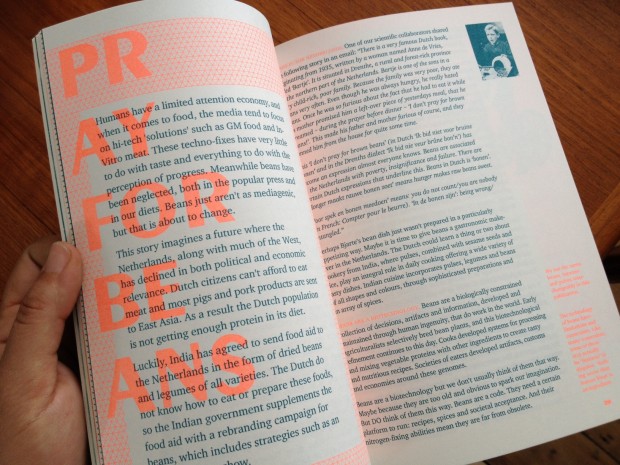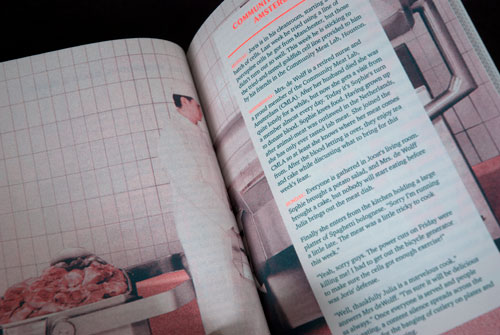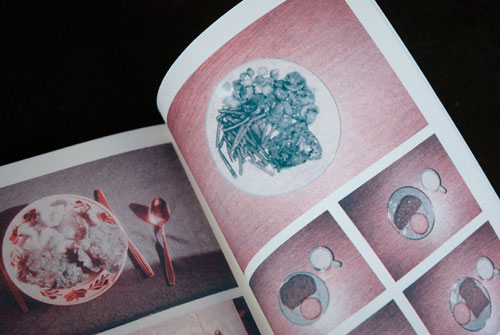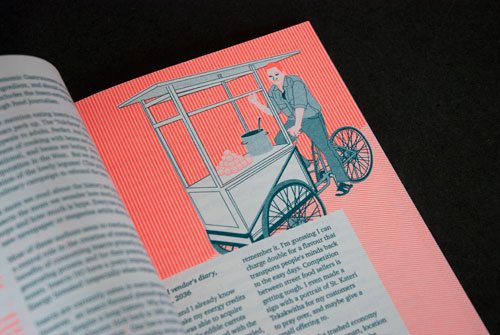Humans have a limited attention economy, and when it comes to food, the media tend to focus on hi-tech ‘solutions’ such as GM food and In-Vitro meat. These techno-fixes have very little to do with taste and everything to do with the perception of progress. Meanwhile beans have been neglected, both in the popular press and in our diets. Beans just aren’t as mediagenic, but that is about to change.
This story imagines a future where the Netherlands, along with much of the West, has declined in both political and economic relevance. Dutch citizens can’t afford to eat meat and most pigs and pork products are sent to East Asia. As a result the Dutch population is not getting enough protein in its diet.

Luckily, India has agreed to send food aid to the Netherlands in the form of dried beans and legumes of all varieties. The Dutch do not know how to eat or prepare these foods, so the Indian government supplements the food aid with a rebranding campaign for beans, which includes strategies such as an Indian cooking show.

Beans in the Netherlands.
One of our scientific collaborators shared the following story in an email: “There is a very famous Dutch book, originating from 1935, written by a man named Anne de Vries, titled ‘Bartje’. It is situated in Drenthe, a rural and forest-rich province in the northern part of the Netherlands. Bartje is one of the sons in a very child-rich, poor family. Because the family was very poor, they ate beans very often. Even though he was always hungry, he really hated beans. Once he was so furious about the fact that he had to eat it while his mother promised him a left-over piece of yesterdays meal, that he screamed – during the prayer before dinner – ‘I don’t pray for brown beans!’. This made his father and mother furious of course, and they banned him from the house for quite some time.
This ‘I don’t pray for brown beans’ (in Dutch ‘Ik bid niet voor bruine bonen’ and in the Drenths dialect ‘Ik bid nie veur brûne bon’n’) has become an expression almost everyone knows. Beans are associated in the Netherlands with poverty, insignificance and failure. There are certain Dutch expressions that underline this. Beans in Dutch is ‘bonen’. ‘Honger maakt rauwe bonen zoet’ means hunger makes raw beans sweet.
‘Voor spek en bonen meedoen’ means: you do not count/you are nobody (in French: Compter pour le beurre). ‘In de bonen zijn’: being wrong/entangled.”
Perhaps Bjarte’s bean dish just wasn’t prepared in a particularly appetizing way. Maybe it is time to give beans a gastronomic make-over in the Netherlands. The Dutch could learn a thing or two about cookery from India, where pulses, combined with sesame seeds and rice, play an integral role in daily cooking offering a wide variety of tasty dishes. Indian cuisine incorporates pulses, legumes and beans of all shapes and colours, through sophisticated preparations and an array of spices.

Beans are a biotechnology.
Beans are a biologically constrained collection of decisions, artifacts and information, developed and maintained through human ingenuity, that do work in the world. Early agriculturalists selectively bred bean plants, and this biotechnological refinement continues to this day. Cooks developed systems for processing and mixing vegetable proteins with other ingredients to create tasty and nutritious recipes. Societies of eaters developed artifacts, customs and economies around these genomes.
Beans are a biotechnology but we don’t usually think of them that way. Maybe because they are too old and obvious to spark our imagination. But DO think of them this way. Beans are a code. They need a certain platform to run: recipes, spices and societal acceptance. And their nitrogen-fixing abilities mean they are far from obsolete.

Beans vs. bugs.
Genomic Gastronomers are willing to cook with almost any genome or ingredient, and should embrace adventurous eating of all kinds. This includes the insect-eating fascination that seems to be sweeping through food journalism.
Whenever we mention eating insects to our collaborators, funders or audiences, ears perk up. The “Yuk-factor” works for kids, and the taboo element appeals to adults. Perfect. And then we start talking about the awesomeness of cooking with beans and everyone gets sleepy. Insects are sensational, and beans are boring. Beans just don’t have a very good reputation in the West. But we are determined to bolster the reputation of the lowly legume! (This publication marks the launch of our culinary campaign to rebrand the bean).
The more we read about the history and proposed future of eating insects the more we wonder how much of planned-Entomophagy is hope and how much is hype. Every two weeks or so since 2010 there is a new newspaper or magazine article about the merits of eating insects.
Most of these authors seem to conclude that eating insects will have a central role in the creation of sustainable food systems. The implied benefits of consuming insects primarily focus on their efficiency in generating protein and for their potential use as a substitute for other meats. Insects DO have a pretty impressive EROEI: Energy Returned On Energy Invested (especially when compared to beef).
Insects are currently eaten in many places around the world. However, an insect-focused planned-gastronomy in Europe remains a fantasy, despite a long history. ‘Why Not Eat Insects?‘ was a pamphlet written by Vincent Holt back in 1885, and yet, over 100 years later, the question remains. One has to wonder what cultural impetus or culinary technology or amazing recipe will finally inspire delicious Entomophagic dishes to show up on pub menus across Europe.
If the honest concern is the need for efficient AND resilient protein sources for the human diet, why aren’t nutrient-rich and nitrogen-fixing pulses getting the front cover?
Healthy ageing researchers and the Center for Genomic Gastronomy share a long term view on food and health. Using a long term view it is clear that the political ecology of the planet will radically shift in the next century. The story may no longer be about Dutch scientists creating Entomophagy programs for the “global south”, but India creating Complete Protein programs for a poorer Western Europe. Now THAT might get people’s attention.

Essay From: Eat Less, Live More & Pray for Beans